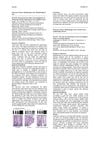4 citations,
August 2023 in “Biomedicine & Pharmacotherapy” Ivacaftor can protect against noise-induced hearing loss by reducing oxidative stress.
[object Object] 1 citations,
January 2024 in “Microorganisms” Mice with a virus similar to COVID-19 had skin damage, but a special treatment helped repair it.
 March 2024 in “Stem cell research & therapy”
March 2024 in “Stem cell research & therapy” Human dental pulp stem cell-conditioned medium, especially from hypoxic conditions, may help treat chemotherapy-induced hair loss and does not increase cancer risk.
November 2022 in “Journal of the Endocrine Society” Marijuana use may be linked to lower TSH levels, but the exact cause is unclear.
 318 citations,
January 2022 in “Signal Transduction and Targeted Therapy”
318 citations,
January 2022 in “Signal Transduction and Targeted Therapy” The Wnt/β-catenin pathway is important for body functions and diseases, and targeting it may treat conditions like cancer, but with safety challenges.
 154 citations,
November 2017 in “Development”
154 citations,
November 2017 in “Development” Fibroblast Growth Factors (FGFs) are important for tissue repair and regeneration, influencing cell behavior and other factors involved in healing, and are crucial in processes like wound healing, bone repair, and hair growth.
55 citations,
April 2015 in “BMC medicine” Stem Cell Educator therapy helps regrow hair and improve life quality in alopecia areata patients.
 18 citations,
July 2022 in “Frontiers in Immunology”
18 citations,
July 2022 in “Frontiers in Immunology” Volatile organic compounds can cause inflammation and increase the risk of autoimmune diseases.
 18 citations,
October 2021 in “Frontiers in Physiology”
18 citations,
October 2021 in “Frontiers in Physiology” Lipocalin-Type Prostaglandin D2 Synthase (L-PGDS) is a protein that plays many roles in the body, including sleep regulation, pain management, food intake, and protection against harmful substances. It also affects fat metabolism, glucose intolerance, cell maturation, and is involved in various diseases like diabetes, cancer, and arthritis. It can influence sex organ development and embryonic cell differentiation, and its levels can be used as a diagnostic marker for certain conditions.
 11 citations,
January 2020 in “Medical Journal Armed Forces India”
11 citations,
January 2020 in “Medical Journal Armed Forces India” Insulin resistance is a complex condition that can lead to many diseases and has few treatment options.
9 citations,
May 2021 in “Frontiers in aging neuroscience” Taking triterpenoids from Ganoderma lucidum over a long time can help slow down brain aging and improve overall health in mice.
 7 citations,
January 2023 in “Frontiers in Cell and Developmental Biology”
7 citations,
January 2023 in “Frontiers in Cell and Developmental Biology” Caspases are enzymes important for both cell death and various non-lethal cell functions, affecting head development and hair growth, with different caspases playing specific roles.
 6 citations,
November 2021 in “Oncology Research and Treatment”
6 citations,
November 2021 in “Oncology Research and Treatment” Low Vitamin D receptor levels in breast cancer are linked to worse outcomes and more bone metastases, and could be a marker for prognosis.
 2 citations,
April 2023 in “Pharmaceuticals”
2 citations,
April 2023 in “Pharmaceuticals” Testosterone therapy for postmenopausal women appears safe and may protect against heart disease, but requires constant monitoring and more research for long-term effects.
2 citations,
August 2022 in “Animals” Essential oils may improve dogs' health and melatonin can help with their sleep and anxiety, but both should be used carefully.
 October 2024 in “Frontiers in Pharmacology”
October 2024 in “Frontiers in Pharmacology” Genetic variants can affect valproic acid's effectiveness, side effects, and levels in epilepsy treatment.
 December 2023 in “Redox biology”
December 2023 in “Redox biology” The substance DMC helps get rid of aging cells by triggering a process that causes cell death, which could treat age-related diseases.
 December 2022 in “Türk biyokimya dergisi”
December 2022 in “Türk biyokimya dergisi” The conclusions are: fecal short-chain fatty acids may help prevent cancer, fiber intake can reduce obesity, weight loss is hard for obese people, low BMI cancer patients are more prone to chemotherapy side effects, intermittent fasting benefits gut health, cherry laurel has health benefits in rats, certain gene variations can increase stress in hair loss patients, fecal acids can affect blood sugar levels, cold agglutinin can affect blood test results in autoimmune patients, and people with Crohn's disease have higher levels of a certain chemical in their blood.
 November 2022 in “Arab Gulf Journal of Scientific Research”
November 2022 in “Arab Gulf Journal of Scientific Research” Taurine is important for many body functions and its deficiency can cause health problems.
 April 2018 in “Radiotherapy and Oncology”
April 2018 in “Radiotherapy and Oncology” Mitochondria may influence how cells respond to radiation, affecting nearby non-irradiated cells.
 125 citations,
August 2020 in “Frontiers in Immunology”
125 citations,
August 2020 in “Frontiers in Immunology” Men generally have more severe COVID-19 cases and higher death rates than women due to biological differences.
 16 citations,
April 2017 in “Journal of Cosmetic Dermatology”
16 citations,
April 2017 in “Journal of Cosmetic Dermatology” Ficus carica leaf extract may help treat skin disorders by reducing inflammation and androgen effects in skin cells.
 August 2019 in “Placenta”
August 2019 in “Placenta” Being overweight or obese before pregnancy increases the risk of having a C-section and a larger-than-normal baby in Chile's public health system.
[object Object]  356 citations,
September 2014 in “Journal of Clinical Research in Pediatric Endocrinology”
356 citations,
September 2014 in “Journal of Clinical Research in Pediatric Endocrinology” Childhood obesity is rising globally due to various factors, and early prevention and healthy lifestyle changes are crucial.
 71 citations,
May 2007 in “The FASEB journal”
71 citations,
May 2007 in “The FASEB journal” Human hair follicles produce and respond to erythropoietin, helping protect against stress.
 67 citations,
January 2022 in “Theranostics”
67 citations,
January 2022 in “Theranostics” Advanced nanocarrier and microneedle drug delivery methods are more effective, safer, and less invasive for treating skin diseases.
 60 citations,
April 2012 in “Physiology”
60 citations,
April 2012 in “Physiology” The document concludes that understanding hair and feather regeneration can help develop new regenerative medicine strategies.
 58 citations,
November 2020 in “International Journal of Molecular Sciences”
58 citations,
November 2020 in “International Journal of Molecular Sciences” SHBG may be a useful early indicator and treatment target for PCOS.
 45 citations,
February 2018 in “Journal of basic and clinical physiology and pharmacology/Journal of basic & clinical physiology & pharmacology”
45 citations,
February 2018 in “Journal of basic and clinical physiology and pharmacology/Journal of basic & clinical physiology & pharmacology” *Acorus calamus* has many medicinal benefits but needs more safety research.
 33 citations,
August 2018 in “Facial Plastic Surgery Clinics of North America”
33 citations,
August 2018 in “Facial Plastic Surgery Clinics of North America” The document explains hair biology, the causes of hair loss, and reviews various hair loss treatments.























